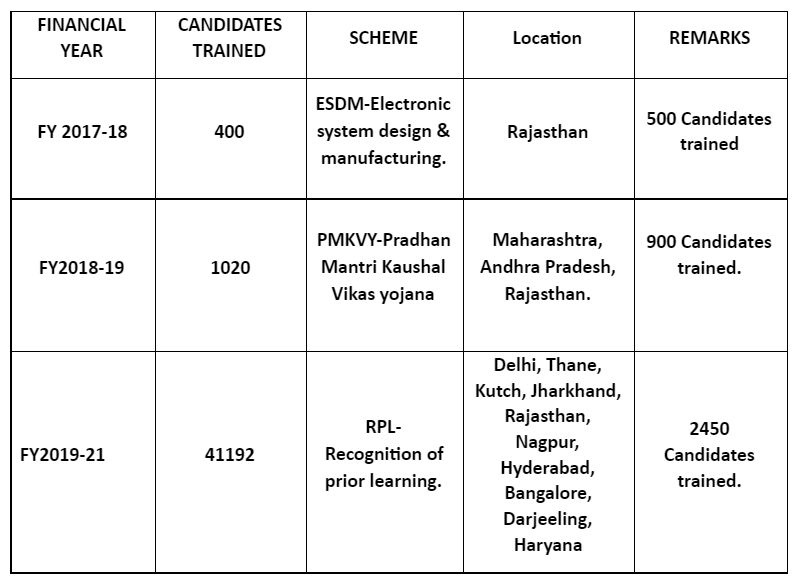Skill Development
We are associated with skill India.
Aspirant Education
Skills for employment, Skills for development, Skills for life.
Our Mission
Skill Development
The insufficient skills and illiteracy necessitate the poor section of the society to put extra physical effort to earn a livelihood. Despite sweating heavily, they manage to earn daily wages merely. “Sadly, a few of them don’t even get to do Labour work daily.”
Poverty means more than simply low income. It includes a lack of voice in determining what goes on in one’s community, as well as vulnerable livelihoods. Food insecurity is often a reality of poverty. Skills development contributes to social and economic integration in poor people’s lives. Skills development can be called a public good. Lack of access to education and training maintains a low level of education and productive skills among the rural poor.

To demolish this profanity from the lives of inferior populations, Aspirant provides “Free of Cost” skills development programs for underprivileged and needy people. Aspirants’ courses are designed and developed to upskill the exploited populations. These programs include Computer Hardware, Beautician Training, Computer Training, Mobile Repairing, Sewing Training, Mehndi Design, Aroma Stick training, etc.
Aspirants’ education Youth Skilling program is especially for young people in the age group of 18 and 25 years, who have done 10th or 12th standard and whose family income doesn’t exceed Rs. 120,000 per annum. The program period is for three to six months, at the end of which Aspirants’ education connects the trained young people with job/business opportunities.
Poverty includes many elements, combining low earning, and the lack to adopt the general goods and services significant for living. Poverty alleviation implies the cutback or elimination of the poverty level in any society. Skill development training in distinct programs leads to procurement of proficiencies to generate abundance through suitable programs with skills and capabilities to develop into self-occupied. Lack of skills and experience and Imbalance between supply and demand for labour may be adjusted by the entrepreneurial skills on how to find business ideas to inspire young people to establish their organization.
In several Surveys, it has been concluded that significant education, training, and skill development programs are extremely necessary for underprivileged groups to have a better life.
Skill development programs are regulated to provide better employment opportunities for underprivileged people. Youngers lack relevant skills of the disadvantaged youth group and an imbalance between supply and demand in that market brings to very low employability and lower wages for them. Aspirant education developed and designed various programs at the national and regional level to encourage health, education, and earning skills development for unprivileged communities.
Through the Skilling program, Aspirant education develops young people with a host of 21st-century skills like teamwork, communications, problem-solving, dealing with self and performance willingness, preparing them to introduce job or launch their own business.
Skill Training Snapshot
Aspirant’s popular courses

- Front desk executive.
- Micro-irrigation.
- Receptionist.
- Sales executives.
- Mobile repair.
- Beauty basics.
- Furniture and fitting.
- Computer-related courses.
- Gardener.
- Food handler.
- DTH installer.
- Delivery boy.
- Unarmed security.
Project Implementation Plan.

Proposed Skilling Methodology
“All stages are guided and supported by documented and regularly updated policies” Extensive checks and balances are driven by the management system.
- Preparation.
- Mobilization.
- Training.
- Assessment.
- Support.
01. Preparation, Identification, and allocation.
- Centre Readiness/Approval.
- Student kit procurement.
- Trainer / Support staff onboarding.
- Content & training delivery plan finalization.
- SSC alignment for assessment.
- Induction of resources from local SHGS: Training on mobile apps.
- Involvement of local NGO Gram Panchayat and Panchayat samiti.
- Identification of mobilization location, based on sectors and projects.
02. On-Ground mobilization and candidate selection.
- Sensitization of program using popular newspapers, leaflet distribution, brand van, radio, roadshow, etc.
- On-Ground mobilization at various places of cities, towns, blocks, villages, etc.
- Collected data is analyzed, Pre-Screening is conducted based on candidate aspiration and minimum requirement.
- Individual and personal counseling to determine the precise course (including Parents)
- Thorough information downloads on programs and their benefits.
03. Training, OJT, and Assessment preparation.
- Expectations and ground rules are set clearly on day one of the training batches.
- Regular internal assessments/counseling.
- Student kits are issued to each candidate.
- QMS guided adults/reminder system.
- Supplementary emphasis is given to weak candidates.
- Candidates are given industry/factory tours.
- Candidates are introduced to additional sessions on self-employment and entrepreneurship.
04. Assessment, certification, and placement.
- At the end of the terms: SSCs are invited to conduct the assessment.
- Local social leaders/ MLA/ MP are invited for certification ceremonies as per RSLDC Guidelines.
- Local press parents and employers are also invited to the ceremony.
- Full social media coverage as per RSLDC guidelines.
- Placement of candidates and smooth transition b/w employers and institute.
05. Support
After placement support services are provided to candidates.
You can support kids’ and young lives’ journey from Childhood to Livelihood.

NEED & IMPORTANCE OF SKILL DEVELOPMENT.
- To mobilize the resources of the individual members for their collective economic development.
- To improve the living conditions of the inferior.
- To build a routine of savings, utilization of local talents.
- To mobilize individual skills for group participation.
- To discover awareness about rights.
- To take care of the representatives financially at the time of need.
Entrepreneurship expansion. - To identify obstacles, analyze, and find solutions in the groups.
- To act as an element for the socio-economic improvement of the village.
- To establish training for skill development.
- To serve in the recovery of loans.
- To gain mutual interpretation, improve protection and self-confidence among youth.
- To build up harmony.

